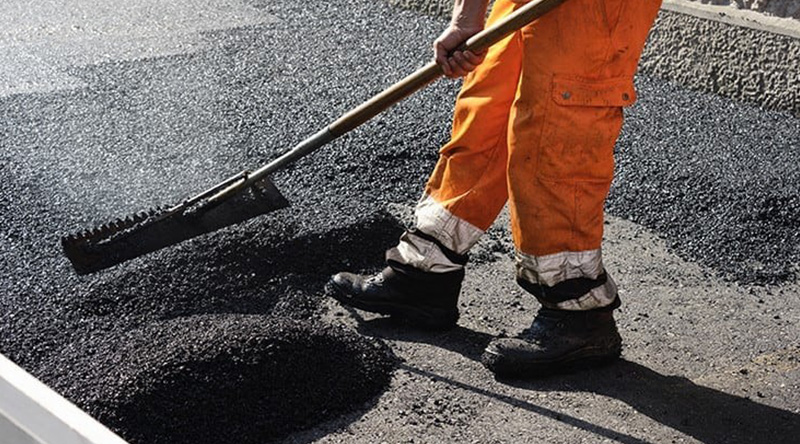Upgrade Your Building's Aesthetic and Capability with Hot Mix Asphalt Paving
Upgrade Your Building's Aesthetic and Capability with Hot Mix Asphalt Paving
Blog Article
Discovering the Ecological Benefits of Hot Mix Asphalt
The usage of Warm Mix Asphalt in framework projects offers an engaging situation for sustainable advancement and environmental stewardship. By diving into the detailed details of its production procedures and the innovative usage of recycled materials, a deeper understanding emerges of just how this technology surpasses plain surface area applications. The environmental benefits of Hot Mix Asphalt prolong much beyond initial impressions, using a nuanced perspective on just how this product can pave the means for a greener future.

Reduced Greenhouse Gas Emissions
The production process of Warm Mix Asphalt includes heating up the mixture of accumulation and asphalt binder to high temperatures. By incorporating recovered asphalt pavement and recycled asphalt tiles right into the mix, the need for virgin materials is lowered, leading to power financial savings and decreased discharges connected with extraction and processing.
Studies have shown that Hot Mix Asphalt pavements have a smaller carbon impact over their life process compared to other sidewalk choices. The sturdiness and recyclability of Hot Mix Asphalt additionally boost its ecological benefits by reducing the demand for constant upkeep or substitute, thereby preserving sources and reducing exhausts connected with repair tasks.
Power Effectiveness and Conservation
The manufacturing procedure of Warm Mix Asphalt not only decreases greenhouse gas discharges but also adds considerably to power performance and preservation initiatives. Power performance is a crucial advantage of Hot Mix Asphalt production compared to various other pavement types. The procedure entails warming the products at high temperatures to develop the asphalt mix, which requires less energy than alternative methods. Additionally, the capacity to reuse and reuse asphalt sidewalk further enhances power preservation. By integrating recovered asphalt sidewalk (RAP) into new blends, the industry saves power that would have been needed to create totally brand-new materials. Furthermore, the durability of Hot Mix Asphalt decreases the frequency of upkeep and restoration, resulting in long-term energy financial savings. This longevity lessens the energy-intensive procedures included in regular repair services and substitutes. Overall, Warm Mix Asphalt sticks out as an environmentally pleasant alternative that focuses on power effectiveness and conservation throughout its lifecycle.
Sustainable Sidewalk Solutions

One trick facet of sustainable sidewalk solutions is making use of recycled materials such as reclaimed asphalt pavement (RAP) and recycled asphalt tiles (RAS) By incorporating these products into the asphalt blends, the need for virgin resources is reduced, leading to reduced energy usage and greenhouse gas discharges throughout production. Furthermore, the reuse of these materials assists divert waste from landfills, adding to a much more lasting and round economic situation.
Moreover, lasting sidewalk options concentrate on optimizing sidewalk design to improve efficiency and long life. Techniques such as warm mix asphalt (WMA) and stone mastic asphalt (SMA) boost the sturdiness and resilience of pavements, decreasing the demand for frequent repairs and substitutes. By executing these innovative approaches, facilities programmers can produce sidewalks that not only fulfill high-performance requirements but likewise lessen their ecological impact.
Minimized Environmental Effect
With a concentrate on sustainability and eco-conscious methods, pavement options are designed to reduce the ecological impact of building and maintenance procedures. Hot mix asphalt, particularly, supplies several advantages that contribute to reducing the overall environmental footprint of road framework. One essential facet is the recyclability of asphalt, which can be recycled multiple times without compromising its quality. This particular assists in conserving natural sources and minimizing the amount of waste sent to landfills.
Furthermore, the manufacturing of hot mix asphalt sends out lower degrees of greenhouse gases compared to other pavement products, making it a much more environmentally friendly choice. The energy efficiency of asphalt plants has actually additionally enhanced over the years, resulting in minimized gas usage and lower exhausts. In addition, the smooth surface of warm mix asphalt minimizes rolling resistance for automobiles, resulting in lower fuel consumption and reduced air contamination from automobile discharges.
Contribution to Climate Adjustment Reduction
Hot mix asphalt plays a crucial duty in mitigating climate modification with its lasting residential properties and decreased ecological impact. One considerable payment to climate modification reduction originates from the energy efficiency of hot mix asphalt manufacturing. Contrasted to various other pavement alternatives, the production procedure for hot mix asphalt consumes much less energy and sends out regrading lower degrees of greenhouse gases, therefore minimizing its general carbon impact.
Additionally, hot mix asphalt's capability to reflect sunshine, known as albedo, assists in reducing urban heat island effects. By reducing warm absorption and retention, hot mix asphalt sidewalks can lower the demand for cooling in urban areas, consequently lowering greenhouse gas emissions related to energy consumption for cooling down functions.
In addition, the toughness and recyclability of warm mix asphalt further boost its climate change reduction abilities. Regrading. The lengthy life expectancy of asphalt sidewalks minimizes the need for constant repair work or substitutes, eventually lowering the carbon discharges connected to road upkeep activities. The recyclability of asphalt products minimizes the need for virgin resources and reduces the environmental influence of pavement building and construction, lining up with sustainable practices for environment change mitigation.
Conclusion
To conclude, Home Page the ecological benefits of Warm Mix Asphalt demonstrate its significant payment to decreasing greenhouse gas emissions, conserving power, and minimizing environmental effect. This lasting pavement solution straightens with environment change reduction initiatives, promotes resource conservation, and enhances infrastructure advancement. By making use of recycled materials, energy-efficient production processes, and durable design, Warm Mix Asphalt plays a critical function in promoting an extra eco-friendly method to facilities building and construction.
The manufacturing process of Hot Mix Asphalt involves heating the mix of aggregate and asphalt binder to high temperatures. By incorporating reclaimed asphalt pavement and recycled asphalt shingles into the mix, the need for virgin materials is reduced, leading to energy savings and decreased emissions associated with removal and handling.
One secret element of sustainable pavement services is the usage of recycled materials such as recovered asphalt pavement (RAP) and recycled asphalt shingles (RAS) great post to read Strategies such as cozy mix asphalt (WMA) and rock mastic asphalt (SMA) enhance the toughness and durability of pavements, decreasing the need for frequent fixings and substitutes. Contrasted to other pavement alternatives, the production process for hot mix asphalt eats much less energy and gives off lower degrees of greenhouse gases, therefore decreasing its overall carbon impact.
Report this page